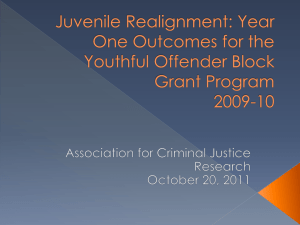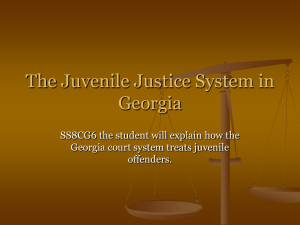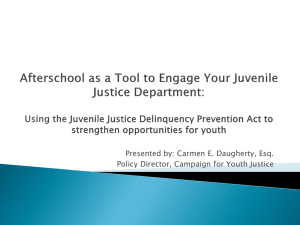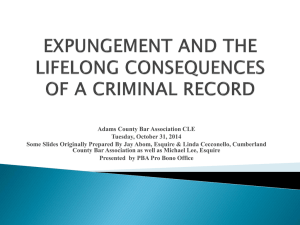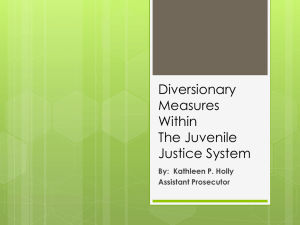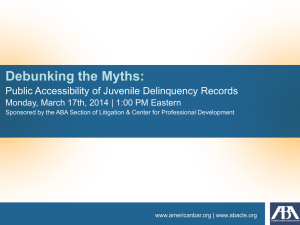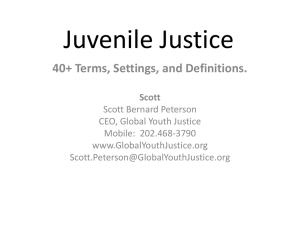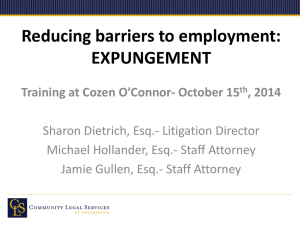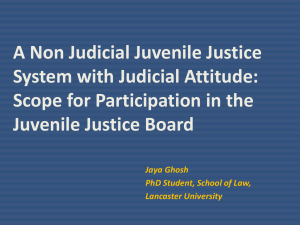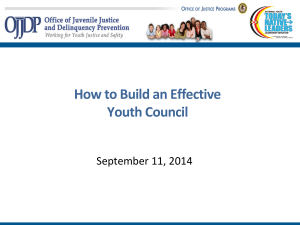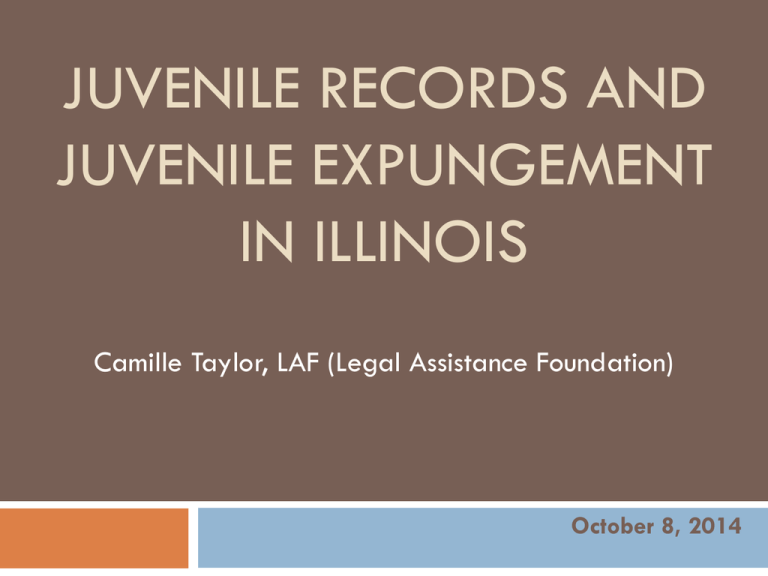
JUVENILE RECORDS AND
JUVENILE EXPUNGEMENT
IN ILLINOIS
Camille Taylor, LAF (Legal Assistance Foundation)
October 8, 2014
Agenda
Introduction
Definitions
Juvenile Records
Expungement
Impact of a Record
Expungement Eligibility
Expungement Process
LAF & CGLA’s Juvenile Expungement Help
Desk
Questions
Common Misconceptions:
Young people I talk to often think:
A person doesn’t have “a record” if they
weren’t found guilty;
Juvenile records automatically disappear
when a person turns 18;
No one can see juvenile records;
Serious offenses can’t be expunged; and
The process for expunging is expensive.
Q: What is a juvenile record?
Juvenile arrests.
Juvenile arrests are:
All arrests under age 17
Arrests for misdemeanors up to age 18 (January 2010 –
December 2013)
All arrests up to age 18 (Since January 1, 2014)
Juvenile arrests are not:
Traffic violations
Ordinance violations (unless petty offense)
Q: Who keeps juvenile arrest records?
…that depends on what happens after the arrest.
1.
2.
Arresting law enforcement agency creates record; and
Maybe sends it to Illinois State Police.
Informal Station
Adjustments Felonies
(mandatory)
Informal Station
Adjustments Misdemeanors
(optional)
Formal Station
Adjustments Felonies
(mandatory)
Illinois
State
Police
Formal Station
Adjustments Misdemeanors
(optional)
Q: What else is a juvenile record?
Juvenile delinquency court cases and petty
offenses.
Where the case is heard determines what rules control
expungement.
Petty Offenses: curfew violations, etc.
Not juvenile tried as adults
Not traffic offenses heard in traffic court
Q: Who can see juvenile records?
Juvenile records are automatically “sealed”…
…but there is no definition of sealed in the
Juvenile Court Act.
-There are also many exceptions, such as for:
•
•
•
•
Schools;
The park district;
The public (for certain offenses); and
Certain kinds of employers.
Q: How can a juvenile record affect a
young person?
1. May be asked to disclose a juvenile record for:
College applications
Job applications
2. May show up on background checks for:
Certain kinds of jobs
Teaching
Nursing
Private security
Other jobs (unlawfully)
Certain Professional Licenses
Public/Subsidized Housing Applications
Immigration/Citizenship Applications
3. Police Harassment
Q: What is Expungement?
Destruction of the police records;
severely restricted access to court records
(available only by motion before the court).
After expungement, no one will see a juvenile history
except:
Military Employers
Law Enforcement Employers
Immigration Officials
Juvenile Expungement Eligibility:
§915(1): age 18, no pending cases
Section 622 (705 ILCS 405/5-622
§915(2): age 21, 5 year waiting period, no adult
convictions
§622: age 18, misdemeanor offense
Never Eligible: Findings of Guilt for First-degree
Murder and Felony Sex Offenses
Please note: sex offender registry
Qualifying for § 915(1) Expungement:
Arrests with no court case
Dismissed juvenile court cases
Supervision satisfactorily completed
Guilty Findings for minor offenses:
o Petty
Offenses
o Class C Misdemeanors
o Class B Misdemeanors
Common § 915(1) Findings of Guilt:
•
•
•
•
•
Assault
Disorderly Conduct*
Possession of Marijuana
Trespass to Property
Criminal trespass to Real
Property
•
•
•
Possession of Look-alike
Substance
Turnstile jumping
False Police Report
Qualifying for § 915(2) Expungement:
Findings of Guilt for:
• Class A Misdemeanors (Those offenses not
qualifying under Section 622); and
• Felonies (Excluding First-degree Murder
and Felony Sex Offenses).
Common Subsection 2 Findings of Guilt:
• Aggravated Assault
• Robbery
• Armed Robbery
• Theft
• Retail Theft
• Criminal trespass to state
property (e.g. a school)
• Criminal damage to property
• Criminal trespass to vehicle
• Battery
• Unlawful Use of a Weapon
Help Determining Eligibility: Expunge.io
The Juvenile Exungement Process
Step #1: Get juvenile rap sheet (arrest record).
Step #2: File petition(s) for expungement.
Step #3: Show up on the court date.
Step #4: Check records.
Step #1: Get Juvenile Arrest Record
Need I.D. (school ID may be sufficient)
May be fingerprinted
Large police departments may issue juvenile rap sheets
Other law enforcement agencies may require a FOIA,
may not give rap sheets
Minimum info: Arrest date(s) and arrest charge(s)
Contact Help Desk if police department says it will not give
any information
Step #2: File Petition(s)
One per arrest/court case
Always in Juvenile Court
$64 Filing Fee due on day of filing (per
petition)
Fees can be waived and make entire
process free!
Help Completing the Paperwork
19
Illinois Legal Aid Online
Free
Form Preparation Program
Office of the State Appellate Defender
State-wide
Forms available for free:
Juvenile and adult
Fillable PDFs
Step #3: Attend Court Date
Please note that some counties may only
schedule court dates if there is an objection to
the petition filed.
Check your local court procedure with the Clerk’s
office.
At the hearing, the Judge will consider the
expungement petition(s) and hopefully grant the
expungement!
Step #4: Check Records
Approximately 60 days from court date:
The
petitioner will receive notification from the
Illinois State Police confirming expungement.
Petitioner will not need to disclose their juvenile
record following an expungement and employers
are not legally permitted to consider expunged
records.
Juvenile Expungement Help Desk
(Cook County)
Mondays and Tuesdays: 9:00am – 4:00pm
Thursdays: 9:00 am – 12:00pm
Cook County Juvenile Center
1100 S. Hamilton, Ground Floor, Chicago
312-229-6359
Thank You!
Camille Taylor| VISTA Attorney
LAF Chicago Children and Families Practice Group
Phone: 312.229.6359 | Fax: 312.612.1517
120 South LaSalle Street, Ste. 900 | Chicago, IL 60603
ctaylor@lafchicago.org
www.lafchicago.org

